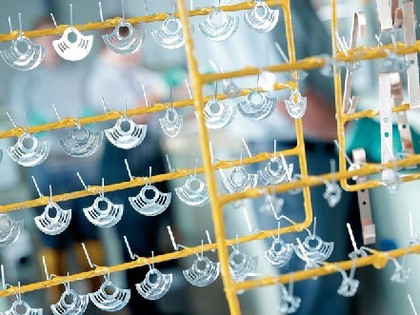-
Lohff & Pfeiffer
About Lohff & Pfeiffer
Iimprint
Contact
Newsletter
Location
L&P team
- Instruments
General
Trade options
About clarinet
Search specific instrument
Ab-clarinet
Eb-clarinet
D-clarinet
C-clarinet
Bb-clarinet
A-clarinet
Mozart basset-clarinet A
G-clarinet
Bassethorn F
Alto-clarinet Eb
Bass-clarinet
Contraalto Eb-clarinet
Contrabasse Bb-clarinet
German-Albert system Bb
Reform Boehm A & Bb
Peter Bastian Instruments
Plateau clarinets
Quartertone clarinet
- L&P Optimization
Optimization
Customization
Specialities
Special Keywork
- Accessories
General
Care products
For instruments
Reeds
Tools for reeds
Straps and hand rests
- Repair
Book time
About Repair
Maintenance
Plating-Surface treatment
Pads
Padding style
Cracks
Tone hole problems
Joints
- Tips & Advice
How to..
Videos
Worldwide external information
Problems & help
Education & learning

.Silverplating
Most clarinet keys are made of Nickel Silver. This is an alloy of brass and nickel and has nothing to do with silver, other than its shiny appearance when polished. These keys will then be either nickel or silver-plated.
We always recommend either silver or gold-plated keys. Nickel plating can promote nickel allergies over time (skin irritations, insomnia, and even depression) and should, therefore, be avoided. Many nickel-plated instruments look worn and tarnished and appear old after only 2-3 years. Silver-plated keys keep their appearance much longer and are also antibacterial - that's why silverware is used as cutlery.
Depending on your diet, finger sweat, and the environment, you might notice that silver plating doesn't last very long or that it tarnishes very quickly. The black patina is caused by sulfa which reacts with silver to become silver oxide. The silver is still there but just discolored. Don't try to wipe off the oxide because you will actually remove the silver. If you can live with the discoloration, wait for the next service and the sulfa, which was caused by the patina, can be removed chemically without removing any silver.
For improved adherence, better instruments have a copper layer between the nickel silver and silver plating. This creates a shinier surface and optimizes the evenness of the key surface. On some instruments, a reddish color may appear on the keys once the top layer of silver has worn away. This is primarily a cosmetic issue and has no influence on the sound. These keys should be re-plated at the next overhaul.
Silver plating will discolor over time, acquiring a darker patina. This is due to the reaction of the silver with sulfur in the air or even sometimes in rubber mouthpieces. More information can be found under taking care of silver
mentioned earlier.
On rare occasions, the silver plating on cheaper instruments becomes pitted and can fall off. This is usually caused by bad plating and requires an entire re-plating job.
If the silver is vanishing (you will see the red copper underneath the silver plating), either re-plating or gold plating might be a better solution.
Help us to get better
Was this article helpful?
Comments, additions or questions are always welcome at: info@clarinet.dk(C) 2014 - by Lohff & Pfeiffer - Brøndbyvej 211 - 2625 Vallensbæk + 45 3535 8643 - SE DK 1895 7485 info@clarinet.dk - Instruments






